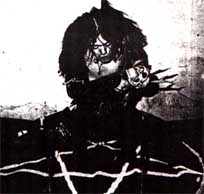Black Metal, Death Metal, Grindcore, Thrash and Heavy Metal Reviews from the net's original Heavy Metal site
Metal Genres
Death Metal Black Metal Grindcore Thrash Speed Metal Heavy MetalMetal Music
Heavy Metal F.A.Q. Interviews Philosophy Metal Concerts Heavy Metal CDs Heavy Metal MP3sMetal Media
Articles Heavy Metal Zines Heavy Metal Video Heavy Metal Books Metal LinksMetal Community
About Contact Metal Forum Letters Mailing ListHeavy Metal as Art and Culture
Why we treat heavy metal like art: it is art. Humans fear ambiguity. Ambiguous situations can get you killed, or make you lose social status when it turns out you were wrong.
Humans fear ambiguity. Ambiguous situations can get you killed, or make you lose social status when it turns out you were wrong.
Truth is ambiguous. Instead, we prefer symbols that like talismans make us feel certain everything will turn out just fine. Politicians promise pleasant symbols. Advertising shows us how a product makes us a winner. Hollywood stars help the poor to make us think they're nice, and put on Motorhead tshirts to be rebellious.
Symbols make us think backward. Instead of observing reality and finding a pattern, we respond to the symbol like a pattern and hope reality complies. Over time, these symbols get corrupted. Underground cultures emerge which encourage the creation of new, more realistic symbols.
In our world of good and evil, we think symbols will keep evil away; in reality, only fighting back against the stupid and corrupt keeps evil away. A genre that makes good seem evil, and evil seem not good but powerful and adventurous corrupts the corrupted. That genre is underground metal.
Heavy Metal is Art
Most music, art and literature is entertainment. It is designed to distract the reader, listener or viewer from their lives, and not challenge their idea of how life should be. Like corrupt symbols, it tries to convince people to follow the symbol because the symbol is safe, seems absolute in its power, and implies stability.
 Art works by the opposite principle. It makes us learn to like ambiguity again, and shows us new spaces where ambiguity allows us to dream. It does not distract us, but draws us in. It does not make us feel safe just doing what we were doing, but challenges us to open our horizons and rise above who we are.
Art works by the opposite principle. It makes us learn to like ambiguity again, and shows us new spaces where ambiguity allows us to dream. It does not distract us, but draws us in. It does not make us feel safe just doing what we were doing, but challenges us to open our horizons and rise above who we are.
Underground metal is a sub-culture. It is opposed to our dominant symbols, but does not create mirror image negative symbols. Instead, it projects an alternate view of the world where all of our fears become hopes and our false hopes, fears. It inverts the inverted, and makes us want to re-engage with life because it is an adventure.
A sense of adventure requires several things. First, it must obliterate the idea that good symbols make us safe. Next, it must awaken in us a sense of fantasy, or desire to explore outside the safe. Finally, it must get us to stop looking for safety, and start looking for power, epic collisions, chaos and ambiguous frontiers.
Not all heavy metal is art. Most is entertainment. Many bands are divided between art and entertainment. However, where it is art, it is the one popular music movement of our time to awaken our fantasy for power, brush aside our fears and make us want to seize life by the throat again, and experience it in full -- both good (safe) and bad (ambiguous).
What is Heavy Metal?
Heavy metal is an evolving art form. Inspired by horror movie music, it is distinguished from other popular music by its use of narrative composition. Where rock music creates a rhythmic strum, metal creates riffs (short, cyclic phrases) that change frequently and together form a song.
 As in a poem, the change in the shape and texture of these riffs narrates a journey in each song. This is what makes metal heavy: it is not purely cyclic like pop and rock, but evolves over the course of each song, culminating in a concluding heavy riff that summarizes all others. Song structure is shaped by the poetic journey of each song.
As in a poem, the change in the shape and texture of these riffs narrates a journey in each song. This is what makes metal heavy: it is not purely cyclic like pop and rock, but evolves over the course of each song, culminating in a concluding heavy riff that summarizes all others. Song structure is shaped by the poetic journey of each song.
The atomic unit of metal, the power chord, is not aligned to a major or minor key. In addition, because it is a moveable chord form that can be played anywhere on the fretboard, it lends itself toward the creation of melodies through centerless chords. This gives metal a lawless, primitive sound and encourages song structure -- the change of riffs -- to replace harmony as its central principle.
Among all forms of music known, the only others to use this "narrative composition" are some ambient works, early music and classical genres. In each one, as in metal, the song structure defines a change in perception by listener, as if journeying to a point of awareness from a point of innocence. It is music that removes context to create a new narrative for the listener.
What are Heavy Metal's Values?
By removing the symbols other human beings use to control us, and addressing life outside the human perspective, heavy metal both affirms reality and the need for us to use our individual sense of adventure to find what is important. It is a rebellion against the "herd morality" that emphasizes safety and conformity over adventure and reality.
Most agree that heavy metal sounds nihilistic in that it rejects conventional "good versus evil" values for a view of life that relishes every conflict, every horror and every instance of human powerlessness. Metal sees negative and positive as opposite forces which together create a majestic playground of adventure called life.
These values are audible to the listener. With its heavy distortion, metal emphasizes finding beauty in darkness and horror. With its centerlessness, it emphasizes looking to the world and nature -- not society and morality -- for our answers. Finally, with its lust for fantasy and adventure, it suggests to us a new world to discover.
As a voice for realism, metal is unsurpassed, because it removes our anthrocentric view of the world. In the eyes of metal lyrics, great events sweep up individuals, and are not caused by them; death and disease suddenly interrupt our consciousness; we are manipulating by others for their own sense of power; there is no conscious personality arbitrating our fate, and no one cares when we die, so we should not live for these false symbols.
Generals gathered in their masses,
just like witches at black masses.
Evil minds that plot destruction,
sorcerers of death's construction.
In the fields the bodies burning,
as the war machine keeps turning.
Death and hatred to mankind,
poisoning their brainwashed minds.
Now in darkness world stops turning,
ashes where the bodies burning.
No more War Pigs have the power,
Hand of God has struck the hour.
Day of judgement, God is calling,
on their knees the war pigs crawling.
Begging mercies for their sins,
Satan laughing spreads his wings.
Many metal bands use the same duality implied by the name "Black Sabbath": an inversion of the safe, tangible, human-centered world. Where we expect to see stability, they see manipulation, with an underlying pattern that encodes evil, instead of a tangible evil we can fight in the same way we combat bureaucracies, businesses and individuals.
At a time when the hippie movement had reached its peak, and people thought they had invented something new with their demands for freedom, Black Sabbath pulled them back to reality by making music inspired by horror movies. In it, the desire of individuals for freedom and the desire of governments for control is based on the same utilitarian thinking, which cannot defeat the horror within. It can fight tangible objects, but what of patterns within tangible objects, as the occult implies? There it is helpless.
In these lyrics, what is fascinating is that the occult demon Satan is paired to the manipulation of society by its oligarchic profiteers in the name of doing "good" by waging war against presumptively evil enemies; in this we see the origins of fascination with inversion as expressed in the name "Black Sabbath": what is claimed as good is often evil, and when one looks into the "heavy" side of thought, one sees that society itself is inverted in its values.
Metal and Classical Music
Superficial similarities between classical and metal do not tell the full story. While bands like Iron Maiden appropriate imagery and topics from classical pieces and literature, and a wide range of bands have borrowed classical motives, the real similarities are in composition and reference a range of classical genres.
In terms of theory, metal most resembles a hybrid between Baroque and Modernist classical music. Its use of narrative composition, or stringing together riffs in ring composition to tell a story much as a poem does the same with language, evokes comparison to all classical music but the tendency to use melodic motives that stay within key resembles Baroque; the use of unison and sonic texture, as well as leitmotifs and foreshadowing, represents contributions straight out of Anton Bruckner or Richard Wagner.
While showy bands often play on pop classical themes, the most important influence is the use of Romantic and post-Romantic modernist themes in lyrics, imagery and song inspiration. The use of national epic poems, stormy and Faustian imagery, and the individual factored out of scenes that show the historical and naturalistic view of a suddenly minimized in contrast anthrocentric dilemma are all parallels to Romantic and Modernist classical music.
Metal and Literary Romanticism
 As individuals, our quest is to find a balance in life between ourselves, society, and the world outside of humans (nature). A number of philosophies have evolved for dealing with this.
As individuals, our quest is to find a balance in life between ourselves, society, and the world outside of humans (nature). A number of philosophies have evolved for dealing with this.
Our modern time is defined by rationalism, or the idea that we can understand life entirely through linear, categorical thinking ("reason") with the goal of making the individual independent from other obligations. In contrast to this, Romanticism arose. Romanticism is the idea that we can understand life only through holistic, emotional and spiritual assessment, and that we need a goal outside of the individual assessed through aesthetics to make life fulfilling.
In Romanticism, the individual is a means of measuring experience and the power and beauty of life, not a goal in and of itself. In contrast, the goal of life is the indefinable, intangible experience of joining with the natural world and leaving behind the demands of society for popular but misguided notions like the indepedence of the individual through social mechanisms. In Romanticist thought, independence occurs from realistic thinking and a desire for significant, powerful experience.
The clearest expression of Romantic ideas occurred through literature chronologically parallel to the Romantic and Modernist periods of classical music. Wolfgang von Goethe, William Blake, Samuel Taylor Coleridge, and William Wordsworth are probably the most compatible; from the late Romantic dovetailing into Gothic, Mary Shelley, Edgar Allen Poe and Bram Stoker are referenced in lyrics and image.
Why Metal Matters
When people are threatened by metal, they either attempt to ban it, to assimilate it, or try to discourage others from listening to it by making it appear as if "everyone thinks" it is dumb or primitive music. Assimilation is an attempt to make metal more like rock music, in the hopes that soon it would lose its distinctive traits and become rock.
We know why it threatens them: unlike every modern and Rationalist impulse, it minimizes the human sense of power over our world. It suggests that patterns exist within the configuration of matter that escape our control; it suggests our own minds escape our control. It eschews the morality of the "safe" for a desire for power, adventure, conflict and destruction.
In short, metal is the feral side of humankind rising against our domesticated and bribed-off side, which does not want to rock the boat or question the dominant patterns of control, both government and social attitudes. Metal challenges all of these, mutating with each generation to find new targets, and is not of the "safe" type of rebellion that rock music offers, which is a hedonism that affirms the individualism, materialism and rationalistic notions of our time.
You will find many mentions of metal music in the popular press, but none that reference (as this document does) its artistic motivations, values and philosophical background. Unlike other forms of art which try to be politically subversive, metal subverts the soul, and for this reason many find in it hope and identity. It is the only significant movement of this nature in the modern time.